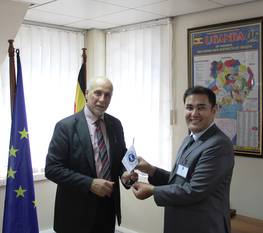|
06.10.2018
Download the press releaseFind photos of the meeting and visit to Kampala hereKampala, Geneva – Uganda, which joined the Anti-Personnel Mine Ban Convention in 1999, declared itself free of all known mine contamination in 2012. While Uganda successfully fulfilled its mine clearance obligation under the Convention, it recognized it had an ongoing obligation towards landmine survivors. Six years onward, Uganda is determined to keep the Convention’s promise “to do [its] utmost in providing assistance for the care and rehabilitation, including the social and economic reintegration of mine victims,” by kick-starting revision of its national disability policy through a participatory national dialogue.
For this purpose Uganda with financial support of the European Union (EU) will hold a national meeting 10-11 October, with over 70 disability and victim assistance experts. Representatives of relevant ministries, landmine survivors’ and persons with disabilities’ organisations, and of the international community will also participate in this national exercise. “We are fortunate that we no longer walk in fear of landmines but the damage inflicted on our population by these weapons is significant. This is because landmine survivors require treatment, income generation activities are not fully met, survivors face stigma and discrimination, and there are data challenges including on the actual number of landmine survivors we have in Uganda”, said Martin Wandera, the Acting Permanent Secretary of the Ministry of Gender, Labour and Social Development (MGLSD) whose ministry is in charge of addressing the needs of persons with disabilities, including landmine survivors. According to the 2014 Uganda Bureau of Statistics’ Census, nearly 4.5 million people (12.4%) have a disability. This number includes thousands of Ugandans maimed by explosive remnants of war, making it one of 29 countries in the world with significant numbers of landmine survivors. Women and children who have survived mine explosions in Uganda are particularly vulnerable. “If we are to properly meet our national and international commitments towards landmine survivors, we cannot address their needs in a vacuum. We must instead improve the rights of all persons with disabilities in Uganda, said the Acting Permanent Secretary. “At this juncture, it is difficult to overestimate the importance of a national dialogue to begin the process of reviewing our National Policy on Disability and developing a National Action Plan, inclusive of all Ugandans regardless of how or when they acquired a disability”.
“This dialogue is part of the EU’s global efforts to advance the rights of persons affected by landmines in countries that are part of the Convention," said H.E Attilio Pacifici, Head of the EU Delegation to Uganda. Photo (r), Ambassador Pacifici receives the Convention flag from ISU implementation officer Firoz Alizada."In 2019, we will support a global conference on victim assistance and disability rights for national experts. Our aim is fostering a world where no one is left behind.” “Discussions that will be carried out at the national meeting such as fostering good health and wellbeing, gender equality, decent work and reduced inequalities are in line with Sustainable Development Goals which the EU seeks to implement through its development policy", said Ambassador Pacifici. "Uganda has a great opportunity to build on progress it has achieved on disability matters. Bringing relevant stakeholders to one place will ensure that this first step in the development of Uganda’s new action plan is truly inclusive and participatory,” said the Ambassador. The meeting is being supported by the Convention’s secretariat, the Implementation Support Unit (ISU). Photo (l), Ambassador of Norway to Uganda H.E. Susan Eckey and ISU representative in Kampala discuss Convention implementation matters.Ambassador Eckey who presided over the Second Review Conference, which highlighted the plight of landmine survivors around the world, together with the MGLSD, EU Head of Delegation in Uganda and landmine survivor representatives will open the two-day dialogue.
|





